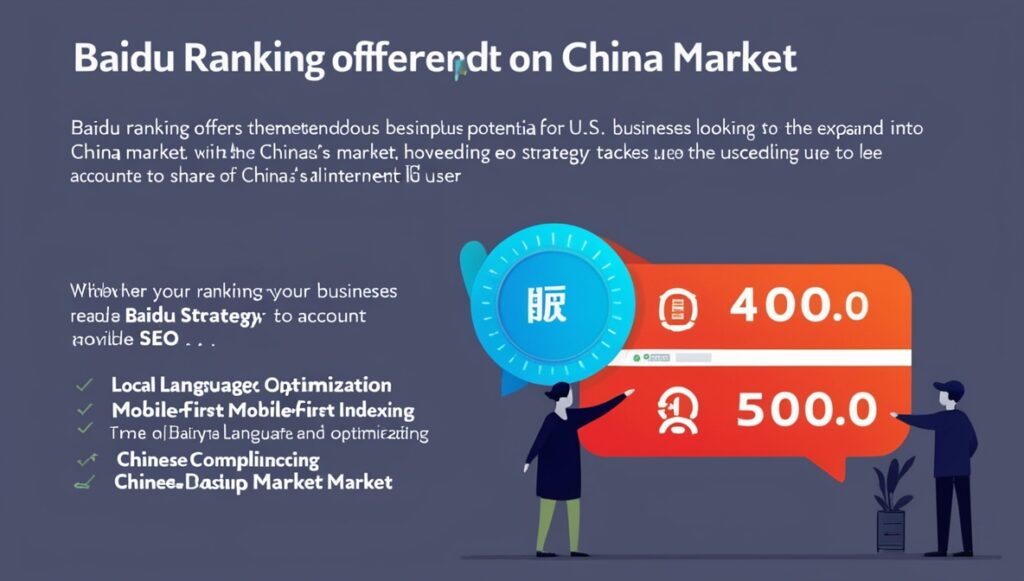
In today’s globalized digital marketplace, search engine optimization (SEO) is crucial for businesses aiming to expand internationally. While Google dominates most global markets, China presents a unique challenge with its own leading search engine—Baidu. As the top search engine in China, Baidu holds over 70% of the market share, making it an essential platform for businesses seeking to tap into the Chinese market. For U.S. companies looking to expand into China, understanding Baidu ranking factors is key to success.
In this article, we’ll dive deep into the importance of Baidu SEO, how it differs from Google SEO, and the best practices to improve your Baidu ranking. Let’s explore how you can use Baidu SEO to grow your business in China, even from across the globe.
Why Baidu SEO is Crucial for U.S. Businesses

China has a vast and rapidly growing online market. With over a billion internet users, China represents a massive opportunity for U.S.-based businesses, particularly those in e-commerce, tourism, and education. However, to succeed in this market, it’s important to use Baidu’s platform effectively. Baidu’s algorithms and SEO criteria differ significantly from Google’s, and understanding these nuances can mean the difference between success and failure in penetrating China’s digital marketplace.
Baidu SEO focuses heavily on local relevance, Mandarin content, and strict censorship rules. Moreover, China’s Great Firewall affects how search engines like Baidu operate, further separating its SEO requirements from Google’s.
Key Factors That Affect Baidu Ranking
Improving your ranking on Baidu requires paying attention to several specific SEO factors. Here are the main elements that drive Baidu’s algorithm:
1. Content Localization and Mandarin Keywords
The importance of content in Mandarin cannot be overstated. Baidu places significant weight on content that is relevant to its Chinese audience. Therefore, businesses must optimize their websites using simplified Chinese characters and target local keywords effectively.
Localized content doesn’t just mean translating your website into Mandarin. You need to understand cultural differences, consumer behavior, and the specific needs of Chinese users. For instance, Chinese users may search for products differently than American users, making keyword research a key aspect of your Baidu SEO strategy.
2. Mobile Optimization
Mobile searches are especially prevalent in China, and Baidu has a “Mobile First” indexing approach. To rank highly on Baidu, your website needs to be fast and mobile-friendly. Baidu also prefers websites built with Chinese mobile habits in mind, such as simplified navigation and concise, relevant information.
According to recent studies, Baidu rewards mobile-responsive websites with better visibility, pushing businesses that are well-optimized for mobile searches higher up in rankings.
3. Website Speed and Hosting in China
Website speed is another critical factor for Baidu SEO. Websites hosted within China tend to load faster, as they are not impacted by the restrictions of the Great Firewall. Hosting your website in China and using a Chinese CDN (Content Delivery Network) will improve your website’s speed significantly, which in turn helps with Baidu rankings.
Foreign websites hosted outside China may experience longer load times due to China’s censorship policies, negatively affecting their Baidu rankings.
4. Backlinks and Trustworthiness
Much like Google, Baidu places importance on backlinks as a sign of authority and trust. However, Baidu tends to value backlinks from Chinese websites more than those from foreign sites. Therefore, building relationships with Chinese websites and gaining backlinks from these sources can significantly improve your Baidu SEO.
It’s important to note that Baidu has stricter rules when it comes to backlinks, so engaging in black-hat SEO tactics such as buying links can lead to penalties or even being deindexed.
5. Meta Tags and Descriptions
Baidu’s crawlers rely more heavily on meta tags compared to Google’s algorithms. Therefore, optimizing your meta titles, descriptions, and headers with the right keywords is crucial to ranking well on Baidu. Ensure that all metadata is in Mandarin and includes relevant local keywords.
Key Challenges with Baidu SEO
While Baidu SEO offers enormous opportunities, it also comes with several challenges that businesses must navigate:
1. Censorship and Content Restrictions
China’s government enforces strict censorship policies that affect how Baidu ranks and indexes websites. Content that violates China’s stringent rules can result in a website being deindexed. This includes political content, sensitive keywords, or anything that could be deemed inappropriate by Chinese authorities.
Therefore, businesses need to ensure that their content complies with Baidu’s strict censorship rules. Unlike Google, Baidu tends to favor websites that align with government policies.
2. Frequent Algorithm Changes
Baidu’s algorithms tend to change frequently, and keeping up with these updates can be challenging. Unlike Google, which provides more transparency about its algorithm updates, Baidu doesn’t always disclose changes. Therefore, regular SEO audits and adaptability are necessary to maintain high rankings.
Baidu SEO vs. Google SEO: What’s Different?
Baidu SEO is fundamentally different from Google SEO in several key areas:
- Censorship: As discussed, Baidu is subject to China’s censorship laws, whereas Google operates in more open internet environments.
- Backlinks: While both platforms prioritize backlinks, Baidu emphasizes local backlinks more strongly than Google.
- Mobile Optimization: Baidu prioritizes mobile optimization due to China’s high mobile internet usage. While Google also emphasizes mobile-first indexing, it is even more critical for Baidu rankings.
- Multimedia Content: Baidu favors websites that incorporate multimedia elements such as images and videos. Having relevant multimedia content can improve your Baidu ranking, especially if they are localized for the Chinese audience.
Best Practices to Improve Baidu Ranking
Now that we’ve outlined some of the key differences between Baidu and Google SEO, here are the best practices to help you improve your Baidu ranking:
- Invest in High-Quality, Localized Content: Create fresh, engaging, and localized content that speaks to your Chinese audience.
- Mobile Optimization: Ensure your website is mobile-friendly and optimized for fast loading speeds, particularly for Chinese mobile users.
- Secure a Chinese Domain and Hosting: Consider using a .cn domain and host your website in China to avoid the penalties associated with the Great Firewall.
- Build Local Backlinks: Gain backlinks from reputable Chinese websites to increase your website’s authority on Baidu.
- Regular SEO Audits: As Baidu’s algorithms are less transparent, regular audits and updates are necessary to maintain your rankings.
Conclusion

Baidu ranking offers tremendous potential for U.S. businesses looking to expand into China’s digital market. However, succeeding on Baidu requires a tailored SEO strategy that takes into account the unique demands of the Chinese market, including local language optimization, mobile-first indexing, and compliance with Chinese censorship laws. By understanding these key differences and applying Baidu-specific SEO tactics, businesses can position themselves to capture a share of China’s growing internet user base.
For businesses in the U.S., partnering with a local Baidu SEO expert or agency like Dust Digital Marketing Ltd. can provide invaluable insights and help navigate the complex Chinese digital landscape to achieve long-term success.

